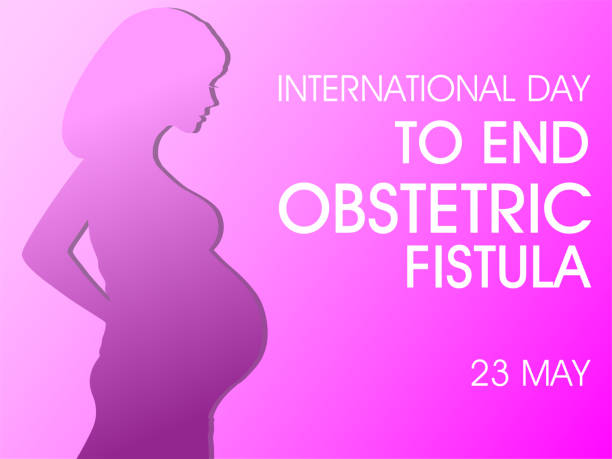An Obstetric Fistula is a medical condition in which a hole develops between the vagina, rectum, and or bladder as a result of prolonged and/or obstructed labour i.e., when a baby is not able to come out of the birth canal easily and she has no access to a caesarean section. Affected women leak either urine or faeces or both, through the birth canal. It is mainly caused by prolonged obstruction labour: usually when the pressure of the baby’s head restricts blood flow and damages tissues between the vagina and the rectum or bladder.
OBF is a global problem but it is especially common in poor rural areas of Africa and Asia. It poses huge medical and psychological burdens because of the stigma associated with the condition. This major public health problem has an estimated global burden of 2,000,000 cases (Geneva: World Health Organisation; 2014) and Nigeria contributes about 150,000. Inclusively, United Nations International Children’s Emergency Fund (UNICEF) reported that Nigerian women currently living with OBF range from 400,000 to 800,000 annually, an additional 50,000 to 100,000 new cases occur in the country. At the current pace, however, it is obvious that the country would not achieve its goal of eliminating OBF within a generation.
It is prevalent in Nigeria due to the existence of socio-cultural beliefs and practices, socio-economic state and poor health facilities. Most of these women are not only disempowered and denied the right to make decisions on when to give birth, how many children to give birth to, how to give birth and to practice child-spacing at will, but they are poor and marginalised, do not have access to quality EmOC, they suffer social isolation, depression, chronic medical problems, marital disharmony as well. Early Marriage/Childbearing; Unskilled Traditional Birth Methods and Attendants; Unavailability of EmOC and poor antenatal care facilities; Poverty and Malnutrition; Psychological damage; Access to Emergency Obstetric Care Services; and Socio-economic factors instigates and fuel and greatly contributes to the high incidence of Obstetric Fistula. Only the following will be elaborated upon.
- Education- UNICEF reported that Nigeria has the highest number of dropout rate from school with one in every five of the world’s out-of-school children and about 16 million children especially girls aged 5-14 years been out-of-school. Literate women have been reported to make better use of antenatal care, family planning information and other reproductive health services. Education is a crucial part of any strategy on eradicating OBF as it not only makes the women knowledgeable; it also aids empowering women with ensuing alleviation of poverty which is a risk factor of OBF.
- Psychosocial Damage- Asides enduring the ordeal of obstructed labour, women with OBF face significant psychosocial challenges such as low self-esteem, feelings of rejection, stress, anxiety, mental health dysfunctions and post-traumatic stress disorders, loss of dignity and self-worth, loss of sexual pleasure, depression and suicidal thoughts etc. In many cases, women with fistula are divorced by their husbands without economic support from the husbands or families.
- Nutrition- Malnutrition as a result of insufficient calcium and Vitamin D could result in pelvic deformities and underdeveloped pelvic which predisposes women to cephalo-pelvic disproportion with resultant POL if EmOC is not instituted in time. With consistent level of malnutrition and poverty among women of reproductive age, they are at higher risk of developing OBF.
What then is the Way Forward/Call to action? Intensive efforts should be made by governmental and non-governmental organisations to reduce the prevalence or eradicate OBF through engagement of stakeholders, innovative strategy to improve access to family planning and policy support to prevent OBF. Also, there is need to ensure availability, affordability and accessibility of quality maternal health services including EmOC by strengthening the health care system. Other approaches should include training of care providers on the prevention and diagnosis of fistula during the antenatal, intrapartum, postpartum periods, early identification and treatment of iatrogenic fistula, prompt referral system as well as assessing all women with fistula-like symptoms.
In addition, it is imperative to organise well-coordinated response to adequate investment in infrastructure, human capital and policy direction that will put the country on the pathway of a sustainable prevention and elimination of this vexing morbidity. There should be political commitment, evidence-based policy, prevention programs against early marriage, FGM eradication and family planning, cheap and affordable interventions, emergency obstetric care and training of champions to lead advocacy, prevention, treatment and rehabilitation.
It is worth mentioning that National Obstetric Fistula Centre (NOFIC), Abakaliki, Ebonyi State, South-East Nigeria is the first National Fistula Hospital in Nigeria. It is the National Reference Centre for the management of obstetric fistula in the southern part of Nigeria established to take care of patients from the South-East, South-South, South-West, and parts of the North-Central geo-political zones of the country. The centre is located at 86km, Enugu-Abakaliki Expressway, and receives referrals from about 20 states of Nigeria and Federal Capital Territory. It has carried out about 3,000 free fistula repairs since its inception.


